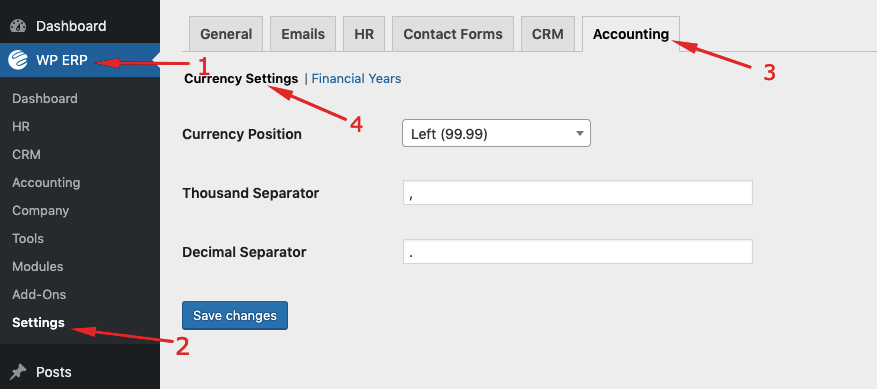Settings
You have already configured your WP ERP core settings with the help of Easy Setup Wizard at the time of installation. If you have missed anything or need more configuration, navigate to WP Admin Dashboard → WP ERP → Settings.

You will find several tabs in this page which will help to setup WP ERP properly.
Please Note: There are several tabs in this menu, some of which will only appear depending on the modules you have activated or installed additional add-ons. Only the settings which are basic to ERP core system are covered here.
Tab – General
From here you can set a launching date of your company, financial year and set date formats among other stuff. This will take effect on your reports and calendar so set this at the very beginning of your setup.
The debug is for the advanced users or programmers only.
Tab – Email
Configure your Predefined email templates from this tab. As you know, the HR & CR module can trigger notification mails on several actions. There are already 4 predefined templates for sending email notifications to users.
General
To make a change to any template, please click on the Configure button to the right of the template.

SMTP
Configure settings for all your outgoing emails for WP-ERP modules.

Enable / Disable: If disabled, the default WordPress mailing system will be used.
Mail server: Use the server address provided by your email service provider.
Port: The port number can also be found in the email service providers settings.
Authentication: Enable and select the type of authentication if you are using any.
Username & Password: For our mailing client to access your email server, you need to provide these credentials.
Debug: This is for developer or power users.
And at the bottom, you can send a mail to yourself or a test account to check if everything is working fine.
IMAP/POP3
These settings handle all the incoming emails for you. Learn more about IMAP and POP3 here.

Status: The status window shows if your incoming mail server is active or working.
Enable / Disable: If disabled, you will receive no inbound emails from your CRM module.
Cron schedule: How often your system will check for inbound emails.
Mail server and Port: Your mail service provider’s server address and port number.
Username and Password: Your mail credentials which will be used to authenticate.
Authentication: The type of authentication you will be using. If you do not match this and all the other details right, it will not work.
Read this documentation to learn more about SMTP and IMAP/POP3.
Tab – HR
This tab controls the settings of your HR module. Configure your office weekends or attendance from this tab.
Workdays
You can set all the 7 days of the week as working, non-working or half-working days. This selection will be recurring throughout the calendar.

Tab- Contact Forms
WP ERP has built-in support for Contact Form 7 and Ninja Forms. If you have any of the form plugins installed, you will find settings to configure your forms.
Tab – CRM
You can configure your CRM module contact importing settings and other settings relevant to add-ons from this menu.
Contacts
You can auto import a WP user or ERP subscriber to the CRM whenever they are created.
Auto Import: Turn it on or off.
User roles: Choose the roles that will be imported whenever a user based on this role is created or added.
Default contact owner: Who will be assigned to the contact by default. Usually the CRM lead or the manager.
Default life stage: What will be the stage you prefer them to be initiated in.

Templates
You can predefine custom templates for customer emails for repetitive tasks like sending joining emails, feedback emails etc.
Creating a new template
Go to WP Admin Dashboard → WP ERP → Settings → CRM → Templates → Add Templates

Selecting a template for sending
Go to WP Admin Dashboard → WP ERP→ CRM → Contacts → Click on a contact → Email → Select the template from the drop-down menu.

Tab – Accounting
Currency Options
Change your default accounting currency and separators from this tab.

Financial Years
In this option, you can add financial years or fiscal years for your business enterprise.

These are all about WP ERP settings.



